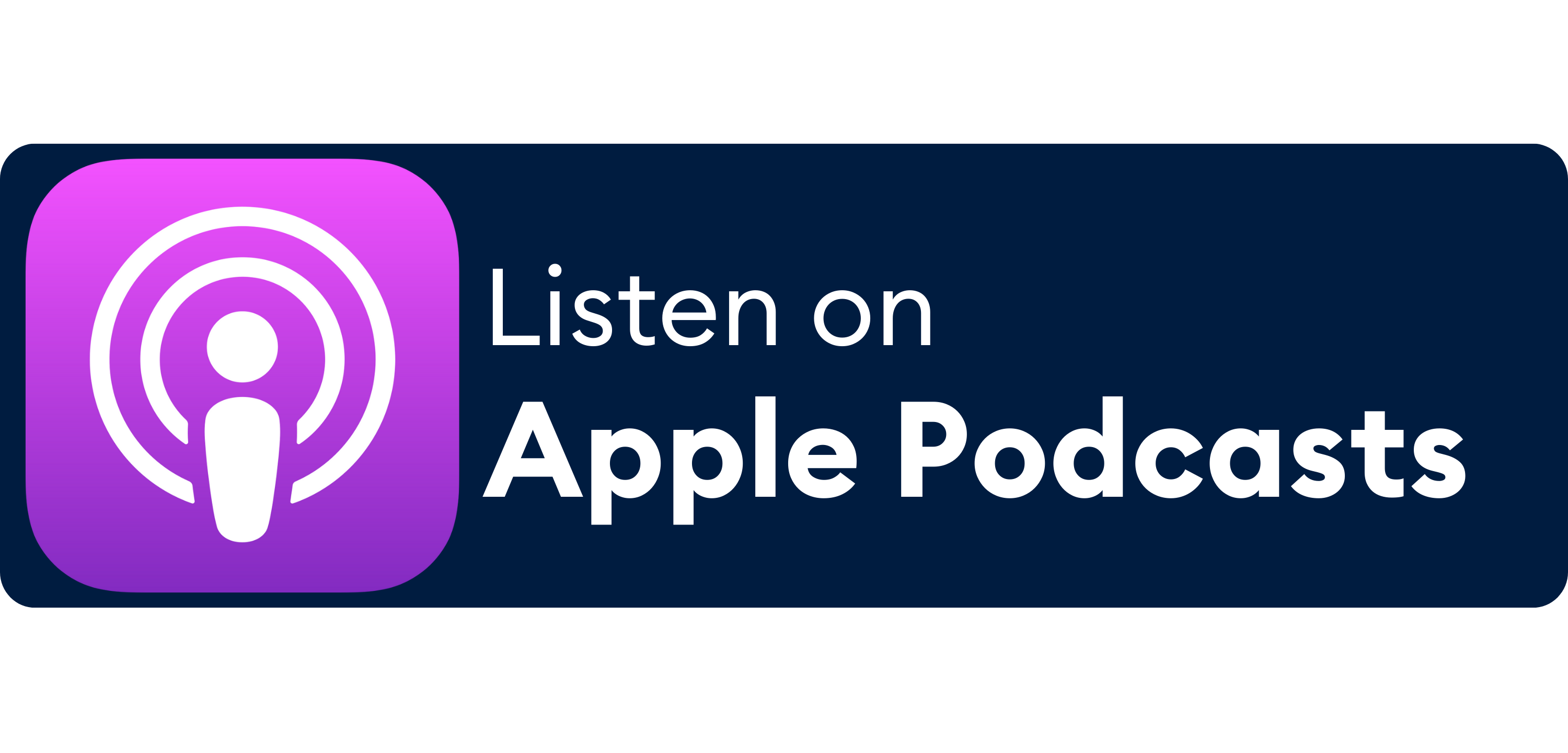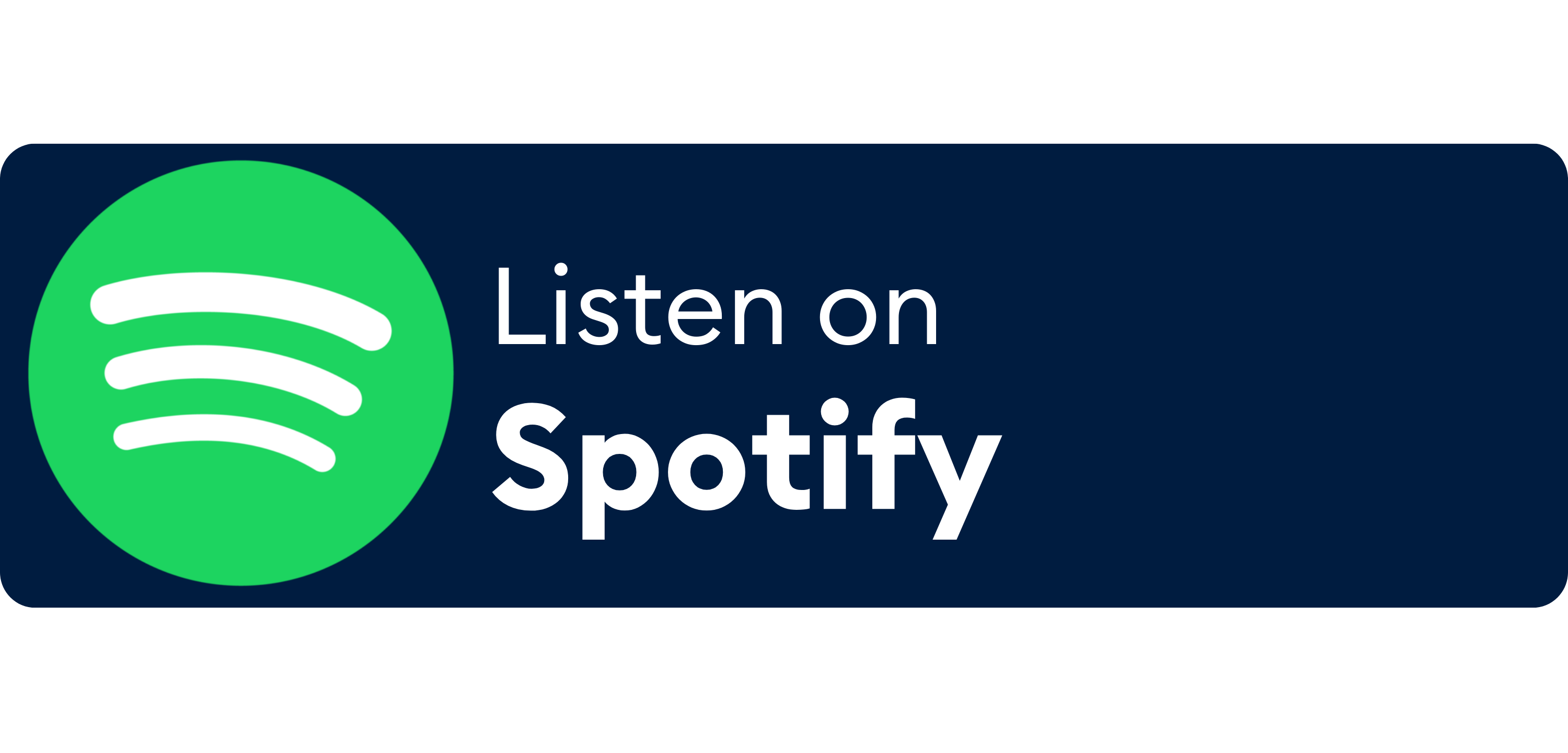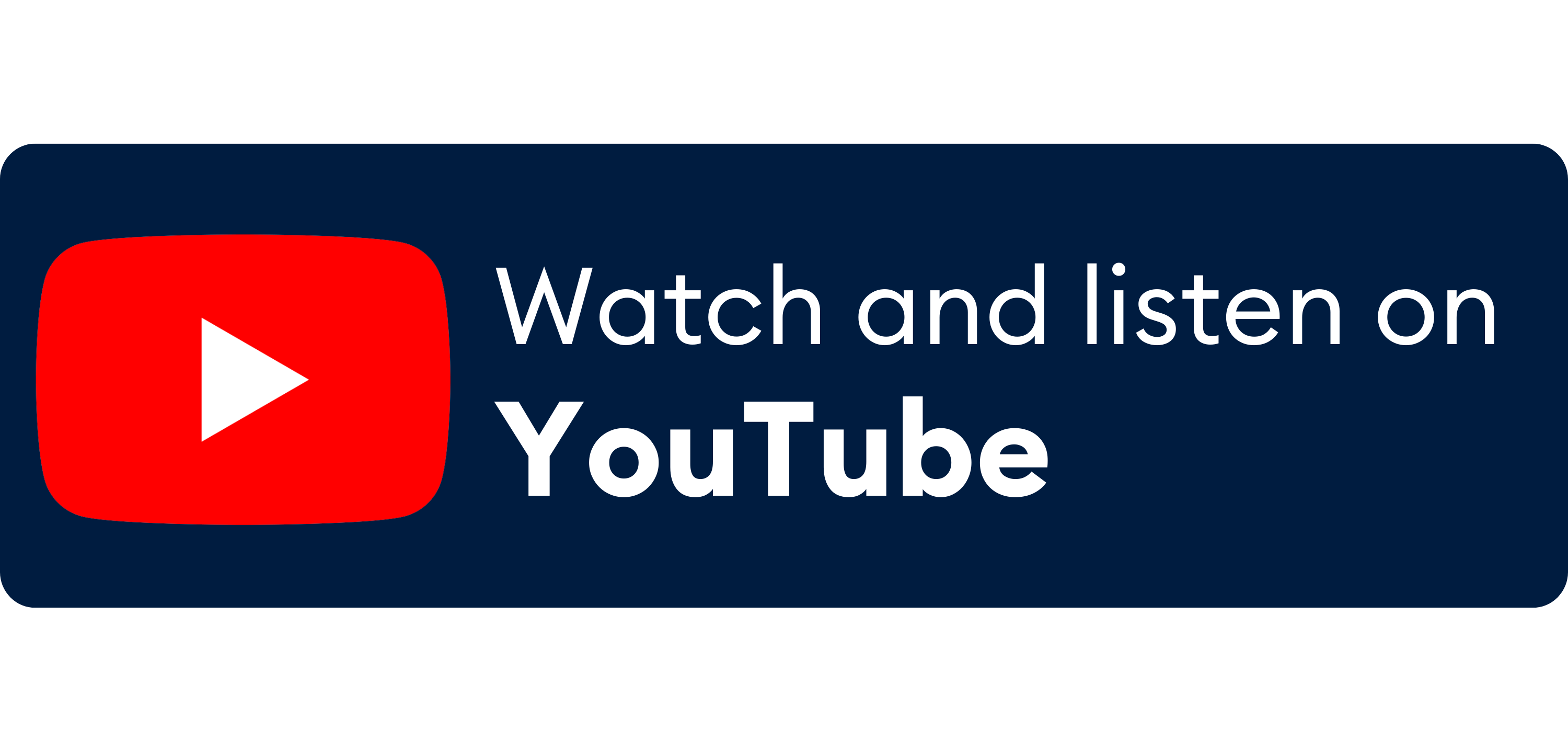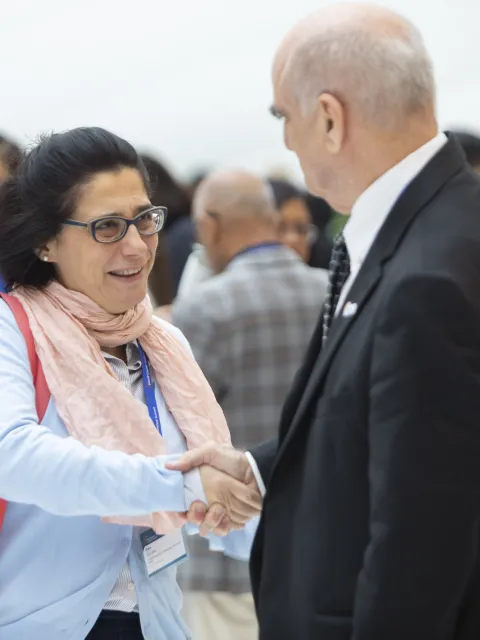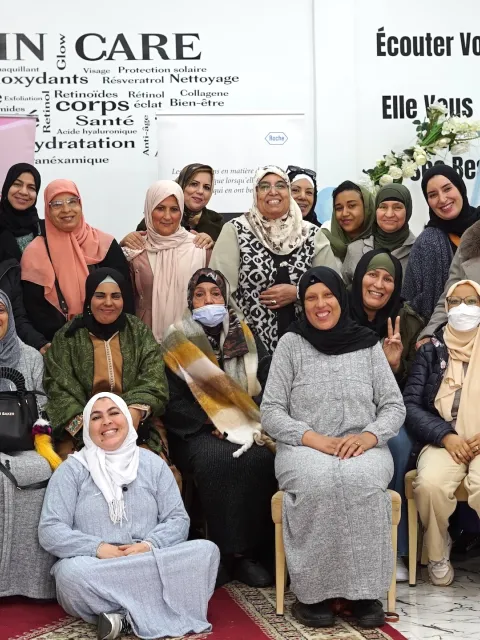
In 2019, Iain Ward was diagnosed with Stage 3 brain cancer. He was given about 5 years to live. Undeterred by the prognosis, Iain decided to dedicate his remaining years to achieving something worthwhile, setting his sights on breaking the world record for the most money raised for running a marathon. Aside from fundraising for a worthy cause, it was also his way of showing that those with mental health or medical conditions are not defined by their condition.
In the last few years, Iain has undertaken a 700-mile charity challenge with rugby stars and run multiple marathons, using his huge social media following - where he is known as "The King of Chemo" - as an innovative way to raise funds.
If you want to support Iain's fundraising efforts, follow him on:
See podcast transcript below
Listen on: Spotify | Stitcher | Apple Podcasts | Amazon Music | Audible | Deezer
Podcast transcript
Cary Adams: Welcome to Let's Talk Cancer. My name is Cary Adams, and I'm the CEO of the Union for International Cancer Control. In 2019, just before his 31st birthday, Iain Ward was diagnosed with stage three brain cancer. He was given about five years to live. Undeterred by the prognosis, Iain decided to dedicate his remaining years to achieving something worthwhile. He set his sights on breaking the world record for the most money raised for running a marathon, and aside from fundraising for a worthy cause, it is also his way of showing that those with mental health or medical conditions are not defined by their condition. Iain, thank you very much for agreeing to talk to me today. It's a real pleasure to meet you.
Iain Ward: Thank you very much for having me on.
Cary Adams: Tell us about when you were first diagnosed. When was that and how did that happen?
Iain Ward: So I was first diagnosed with brain cancer a little around four years ago. Now coming up to four years. And prior to that, they had had a scan on me, a pretty much a random scan. And in a very lucky and unlucky way, they were able to see the tumour.
Cary Adams: And why did you have a scan?
Iain Ward: Oh, because I love money, but I hate working at stuff that I don't enjoy. So, I would do medical trials quite a lot. And then my regular income would be teaching fitness classes.
Cary Adams: And so you went on a trial?
Iain Ward: Yes. I've done several medical trials before. And one of the these particular trials that we went on, they always have to make sure that for my category anyway, sometimes they deliberately do medical trials on people who are, who are sick to see the certain medications work. But for me, it was always like, we need healthy young guys or healthy young people, whatever the category particularly was. And so they went in, they were like, okay, cool. We've just got to make sure, certainly, that you are healthy and that you're fit to be the sort of the the control. If you understand the processes of, scientific research, you need to be a control element in this. And so, they went and they tested and they scanned my head, and then they said, you have, a brain tumor in here. It looks like it's benign, but you have to get this, checked out. You have to get this known. And then, of course, they asked afterwards, like, have you had any headaches? Have you been like, you know, dizziness, any, poor ways of articulating your your words, anything.
Iain Ward: And it was just no no no no no no no. And like, nothing, nothing at all. And I'm saying absolutely no symptoms whatsoever. And then so when I went in for my second scan and I spoke to my, the brain surgeon about it, he was saying, like, you know, now, Ian, we've just done a second scan and it does look cancerous. And that is bad news. But I can't stress it. I know this is not the right time to tell you this, but you have no idea how lucky you are, to have caught this without symptoms because, brain cancer, a lot of young people, the survival rate is quite low with it. And so the fact that I was able to catch it, not before it had developed from like stage one to stage two to stage three, because it was stage three when they were able to see it, but before it started affecting my ability to do anything. And so, yes, I'm the luckiest unlucky man in the world.
Cary Adams: Yes, that's a good way of describing it. So I understand that you, underwent brain surgery whilst you were awake.
Iain Ward: So, the reason that they do that is, your brain is. I always like to use the metaphor that your brain is much like, like a room in a house with different things within the room. And so quite a lot of your brain is actually space, but, your brain can actually move that into different rooms in the house, so you can actually convert, you know, your, your sitting room into a sitting room with a kitchen. And so what they do is they go in and they just try to remove the space as much as possible without damaging the stuff that's practical, like the bed, the chair, the couch, the sofa, things that humans use. And so the way they do that is they prod around and they have just like, as far as I know, it's just sort of like a pencil. And so they poke and then because it was on the, the left side of my brain because I'm right handed, which is really interesting, I think that that it makes such an effect on how your brain works. my right temporal, my left temporal lobe, because I'm right handed, is the area of speech. So when they were poking around, they were simply asking basic questions like we were playing an incredibly boring version of articulate, where they would have a photo of a cat and a dog on thing, and they would say, what's this? And it would simply look for me, slowing down like I just did there, where I would be like, a cat. And they would look for areas where I would be pausing and not getting.
Iain Ward: Quickly to just say, that's a dog, that's a cat, that's a bear, that's a pole, that's a whatever. From that, they were able to be like, okay, this is functional tissue. We won't remove that. Let's move around somewhere else. This is not functional tissue. We can remove this. And so they removed the space, not the, utensils, not the, appliances. Then what happens afterwards is actually more interesting as your body, as your brain heals. It has something called plasticity. The younger you are, the more of an effect this can have. so that was one of the things that they were saying when they're talking about you have five years to live, but that's an average. We don't have 30 year olds in. the younger you are, the more your brain is able to repair. And so what my brain might have done, we don't know. We won't know until, like, there's a there's a second surgery if that happens at all. my brain might have moved all of the pieces in my left temporal lobe that are associated, associated with them, speaking and articulating into a completely different section. So if the tumor is in the same location as it was beforehand and we're going in for a second surgery, they might remove a larger portion of the tumor and absolutely nothing associated. It might have something to do with my speech. They might. My brain might have moved completely into a different, lobe. And so the second surgery might even be more effective than the, the first one. So there you go.
Cary Adams: That's fascinating.
Iain Ward: It's very interesting, isn't it?
Cary Adams: And tell me, tell me, tell me what? What was it like?
Iain Ward: have you ever seen Casino?
Cary Adams: Is that a film?
Iain Ward: It is, yes.
Cary Adams: I don't think I have.
Iain Ward: It's a it's a Scorsese film. And there's a scene in it where one of the main characters in it, one of the nasty guys in it, is, trying to get information out of someone in there. They put his head in a vise, grips, and they're squeezing his head. And that's kind of what it feels like, because it's even though they open up your, your head under a, a numbing agent under an anesthetic, they still the, like the pressure of what's going on. You still sort of feel that your brain doesn't have a nervous system, and then the actual sort of, incision in the even the drilling of your skull open, it's not actually that painful in terms of, like, if someone was pinching your arm, you'd feel it right there. But you just you feel this the the pressure and almost the inflammation that comes afterwards, just in your whole head. So it's, it's difficult in that regard. But, to be honest, the, the painful part of the whole situation is that you have to remain perfectly still in, I was in the fetal position, so, like, up on that. And it was, after about like three hours, maybe four hours. my, I think it was four hours in total. My hips were just cramping up really bad. Even though that's a natural way to sleep, you still are shimmying around when while you sleep. Or you can't do that while you're, under the knife. And, um. Yes, that was what, sort of, they were like, right. This is he's going to start to twitch soon enough. These are serious cramps. This is, we have to end the surgery now.
Cary Adams: And, from that experience, you were inspired to do something difficult and meaningful. So tell us what happened.
Iain Ward: It was simply that, I had I had a very small, social media account based on, just playing video games. And, that was because over Covid, we we just had all this free time and we had this idea of starting something like this up anyway, because me and, my housemate at the time, we, we both really like playing video games. So we were like, ah, this is this can be a bit of a waste of time. Let's see if we can turn this into something that's a bit positive, a bit creative. And then so I already had the, the, the concept of right. Well, if I'm going to continue doing this thing, I need to address the elephant in the room, because people are going to be able to see the side of my head. People are going to be able to see the scar for for the first couple of months, we don't know how much radiotherapy is going to affect my hair. So like there might be no ability to cover it up. So we have to mention this. So the idea where it was like, ah, yes, I'll do something for, for charity that was already sort of in my mind. And then, after the once they gave me the prognosis after the surgery where they're able to do tests on the, the tissues themselves, that was the point where I was like, right, this is serious.
Iain Ward: There's like, I didn't slip out. I didn't get away with it. and then, from that point, it was like, how about I use, this against itself, where I know I'm able to, like, walk around and I'm able to physically do things I might get tired from the chemotherapy that I've got coming up, but I'm still going to be able to do certain things. And, so it was like, I, I knew it kind of made a unique story. A good story requires, something to overcome and to something to, to get past. And it was like, right, you have that, but you kind of have a cheating version of it because you've brain cancer, and brain cancer doesn't affect the body or the nervous system until it. Those your. You're fine until it does. And then once it starts to really hit you. It hits you hard, and then you often die quite soon afterwards. So in my mind, I was like, right, you have a window where you have this title, but you don't have the negative things associated with this title of being having someone with cancer. So you could take advantage of that. And that's I, that's me. I just saw that as an opportunity. I was like, you got to do this and you got to do it, right now.
Cary Adams: And you decided to go for a world record, is that right?
Iain Ward: Yes. I was just tinkering around with the, on the internet of, like, how much is the most money someone's ever raised for this? I had done a marathon before. I knew the association with running a marathon and how it's like, basically like a cake sale. it's it's just it's a gigantic charity event. And so that was the first thing that I went to, and I was like, okay, the world record for most money raise for, running a marathon is, 2.3 million, great British pounds. So that is a lot of money, but it is not an amount of money that, I think, is sort of out of my reach from someone who's starting from nothing and then, same sort of thing where I was like, okay, let's see, the marathon is great for normal people to, have a world record with, because you can just dress up as something silly and you can be as specific as you want. You could be like, I want to be the fastest person to run a marathon dressed as a remote control. It really doesn't matter. The Guinness World Records do not say no, no, no no no, that's silly. We're not doing that. And so I looked up like, let's do video games. Seeing as how I, I've started a social media channel based around video games. So I looked up the fastest person dressed as a video game character, and it's just under the sub three-hour mark, which is very hard to do, but much like the millions earned, it's something that if one was to focus, it could be achieved. And so, yes, the first two marathons are two world records that I looked up. They were the first two that I chose to make my life goal about.
Cary Adams: And how is the fundraising going?
Iain Ward: Because this is such a unique thing to want to do. I knew that I had to do it in a unique way. And, particularly with how much Covid was affecting people's finances, I knew that if I was asking for donations, that it would have a start, but then it would hit a plateau, it would hit a wall, and then I wouldn't be able to push past it, and then the momentum would stop, and then I think it would fizzle away. And so what I thought of was, if I just ask people to follow the account and then, with the account getting large with the social media accounts getting large, I can then ask businesses to sponsor me. But I get the sponsorship money to go directly to the cancer, research charity as opposed to going to me. And so I thought, it doesn't matter what happens in the world in terms of finances, whether there's like, you know, everybody is absolutely like, the poorest we've been in a century, people will still be able to follow an account on social media.
Cary Adams: I understand you got over 5 million people.
Iain Ward: Yes, 4.8 on TikTok and then, 2.5 on Instagram.
Cary Adams: And how important is that, that following to you in terms of what you're doing?
Iain Ward: It's vital. It's absolutely vital. If there's no followers, then it's like, how am I going to be able to pitch to, a company like Myprotein and say, hey, can you like, give us a load of money and I'll advertise? It's like, well, what you're doing is, you know, admirable, but, who advertise to who? You know, you haven't got a platform, you haven't got an audience. Why would we involve you? And so that's why having the large social media channel is, is so important. And so the, the fundraising has been going, really well. The American Cancer Society have now sort of, put a page exclusively on their website just for what my achievement is, which makes things so much easier because it just stamps out any doubt, any kind of, an organization would ever have to be like, you know, what's, where's the the money going? I was going on a world record like, ah, I don't know, this guy swears a lot, and he's sort of a bit manic. Let's say, let's not do that. But when it's such a strong association with a household name like the American Cancer Society, it means like, okay, this guy's reliable.
Cary Adams: Forgive my ignorance. Where is the marathon?
Iain Ward: Which one? I'm doing 12 this year.
Cary Adams: Oh my word! Where are you doing them?
Iain Ward: All right, so in chronological order, I'm doing Boston in five days, London in nine days. Then we have a big summer break. There might be some more that pop up in the meantime. And then, in a 35 day window, a five week window, we have Berlin, Chicago, Antarctica, South Africa, Perth, Istanbul, Istanbul again, Colombia, Miami. And then the last one we do is New York.
Cary Adams: I'm just tired listening to that.
Iain Ward: Yes, it's two marathons a week until October.
Cary Adams: And you raise money not just for cancer but also for mental health. Can I can you explain why why you did that.
Iain Ward: Years and years ago now, I think it's just gone 11 years. one of my close friends, he ended. His own life, he committed suicide. And so it's always been more of a like a personal thing for me. It's the same when I was raising money for, for Movember. Movember, a big part of being both cancer research and, mental health is, is a big focus of theirs at the moment.
Cary Adams: With regard to, you know, the cancer and mental health, though, there there are lots there's lots of studies and evidence that cancer treatment in itself and survival of cancer can cause significant mental health problems. Are you aware of those and has anything like that occurred to you?
Iain Ward: I mean, it's almost impossible to avoid, the awareness of those sort of things. I myself have, have not lost. Anything within my own sort of, body. My ability to exercise hasn't been affected. I don't have regular headaches. I've lost a bit of hair, but, like, I've got big, thick Irish hair. So I have a sort of a I don't even need a comb over. It's not up here. It's on the side. So my hair naturally covers it up and I, you know, you can look at old photographs of me on Facebook. I rock a a long haircut most of the time anyway. So that's the only sort of major, issue with me personally. but the association that other people have where it can take away so many different things of your life and it's you're not going to be able to get them back. I'd imagine it hits people very hard. And in a lot of ways, I'm asked quite a lot about how, how I'm able to deal with my situation in such a, a positive way. And this one, this one is luck, because I don't think it's anything that I've earned, but I just have, a disposition where, I it doesn't bother me so much of what I've, what I've gone through.
And I wish I was able to give the advice of what I sort of go through every day to overcome that, but I just don't know what it is. I suppose the, the ongoing issue that I have, would probably be, with relationships because it's. It's like I'm at the age now where I don't want, like, a one night stand. I don't want to, you know, date a girl for a couple of weeks. Like, I want to have a partner who's, you know, my other half. For as long as, you know, we can tolerate one another. And then, but from a sales point of view, if it's just purely, you know, business, if you could think of marriage just purely as a business for this particular situation, if I say that I have a a possibly very short shelf life. any smart woman would say like, okay, well, worst case scenario, I fall in love with you. We we're going. Great. But then, you know, you die early and then, you know, you're not around. And then I'm sad for the the rest of my life because I've, I've had you and I've lost you.
Iain Ward: Whereas, if I had say, and I'm not using this as a comparison to be like, lung cancer has it easy. But if I say I had lung cancer and then I went through all my treatments and, it I had to lose a lung, but then I was in remission because they can't really determine remission from, brain cancer because they can't remove all the brain, tissue. It's just too difficult to do that. Whereas they can do that with lung cancer. They can get rid of it all. And then you can kind of say, like, I've been in remission. So I know I've dealt with cancer. It's in a past tense. And then you could sort of, I think you could, get into a relationship and someone could be like, yes, they dealt with something. They can't run anymore. They can't do marathons. But, like, you know, he's still going to be alive when he's 70, unless, you know, something else pops up. So I suppose that's my thing that I have to deal with in my mind.
Cary Adams: Let's move on to some of the vocabulary that's used with regard to cancer. A lot of it is good old fighting talk fight cancer survivors and things like that. a lot of battle metaphors, as they call it. Is this something that you relate to or not?
Iain Ward: Me personally, no, but it's, it goes to that same sort of hopeful ethos of we like, we need to get together, we need to group together, and we need to fight this thing because I think people prefer the idea of fighting something because it's something that can be physically, done. It requires you to show up somewhere to have trained for this and be ready. Whereas the reality of it is to fight cancer is incredibly difficult to do because it's it's it's it's more of a passive thing. It's more of a metaphorical thing which people, are like. And I'm not saying like, I'm not included in this myself, but it's it's a far more difficult concept to battle against. I would imagine a lot of people can't even like it wouldn't be something that you would say about mental health as a as a comparison. You wouldn't hear people saying like, we got to fight mental health because it doesn't quite suit, because mental health, it's it's it's even more of a, what's the word, a passive, thing. Whereas cancer in, in a way you can see it as a physical thing because there are physical ways to deal with this chemotherapy, which is a physical thing. There's more exercise. There's, you know, there's a slight more of a physical association. So that's why I focused on the, come to war with me, join me and whatnot.
Cary Adams: Well, as a king, I suppose you're allowed to do those things. You're allowed to call your your people to go to war for you. How do you feel at the moment? Nearly four years on?
Iain Ward: So, it was coming up to four years ago that I was given the statistics in this situation. You have these different sort of attributes, the research. It says that the average life expectancy is about five years, but this is an average. It's based off of a bell curve. Some people who have brain cancer live until, you know, 30 years. Some people die within a month. It's an average. So the average years for someone in my situation was five years. But then the doctors also added, but you are 30 and we do not have data on 30 year olds with no symptoms. It just doesn't happen. People who have no symptoms to go in to get a scan are usually in their 60s, because that's something that people do after retirement. It's like, I'm now retired, I'm going to go do a big medical check, see if there's anything going wrong with my body. And that's where the non symptom scan occurs, where as 30 year olds, you know, we don't go like, you know I'm not feeling sick in any way. I'm going to go get like, you know, a full medical examination. I think it was two years ago. We got a good result saying that there's a slight shrinkage in the brain tumour. And since that slight shrinkage every three months with the scan, it said that there has been no growth. So we're in a we're in a good place as much as one can hope for in in a place.
Cary Adams: And what would be your recommendation to or advice to others who receive a cancer diagnosis? Well, probably similar to yourself. What's been the reaction to from people online to your story or your filmmaking, as you know, is has it been an overwhelmingly positive? Have you had supportive? What what's been the overall reaction?
Iain Ward: Yes, I'm a social media unicorn. No one else has a channel that is or has channels that are as big as mine. And really, I don't get that much negative feedback. I was expecting people would be like, this is a scam, like, this is fake and it doesn't happen.
Cary Adams: And do you find that your stories inspiring other people and they're not just following you because they're interested, but it's inspiring others with cancer?
Iain Ward: I think the the most powerful ones that I've, come across is where someone has said something that has, tangible isn't quite the right word, but I can imagine it being a truth because I do the same thing sometimes. And they were saying that they were in their bed and they were flicking through their phone, you know, just as people do. And then I came across one of my videos and it inspired them to get out of the bed. And that's a small thing, but it's also a big thing. And I know because I've been in that sort of situation myself, where not even necessarily that I've been massively depressed, but I've just been wasting my time flicking through on Instagram or TikTok or whatever. And then a video comes along where it's, you know, encourages you to get out of the bed and actually start living life for someone to simply say, I got out of bed because I watched your video, that's that means a lot.
Cary Adams: Iain. It's been a real pleasure talking to you. And I really appreciate your, you know, incredible character.
Iain Ward: Thank you very much. Make sure you get out of bed tomorrow.
Cary Adams: Iain, good luck with the marathons and I hope it goes well. And, I'll put you on my follow list as well. So you've got one more follower today. I hope you enjoyed this episode of Let's Talk Cancer. If you want to hear other inspirational stories by living people, sorry! I hope you enjoyed this episode of Let's Talk Cancer. If you want to hear other inspirational stories by people with experience of cancer, why not listen to episode 29 on caregiving for a loved one with terminal cancer. Episode 23 on racial disparities in breast cancer. Or episode 14 on overcoming eight cancer diagnoses. And as always, do reach out at communications at USC. Org or on social media with any questions and suggestions.
Last update
Wednesday 19 June 2024